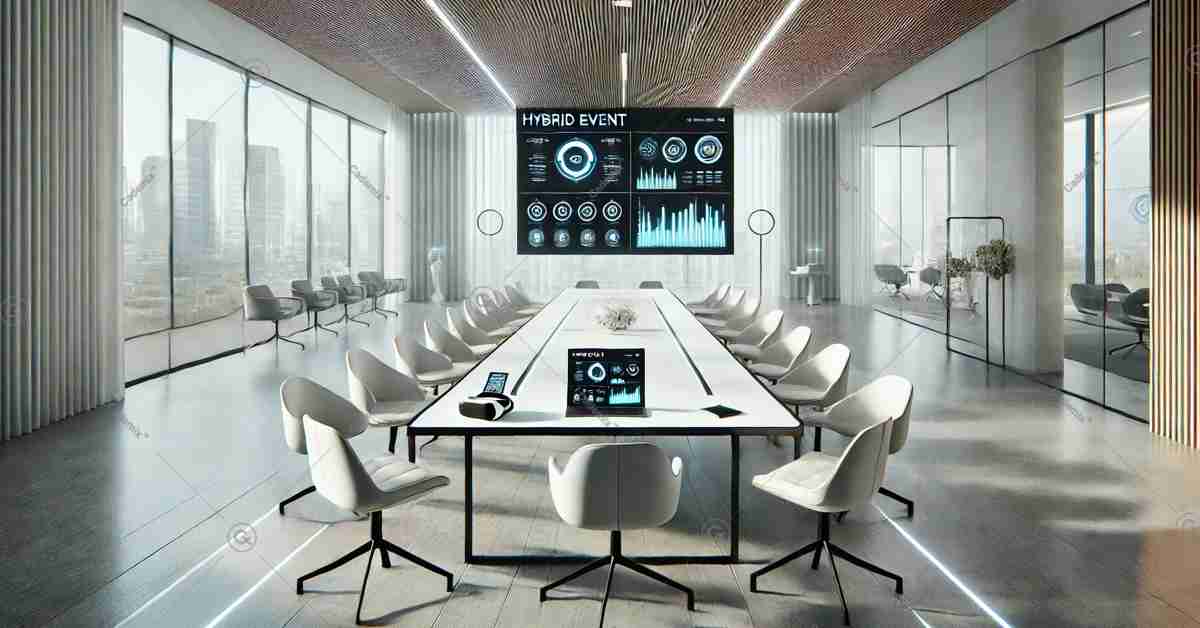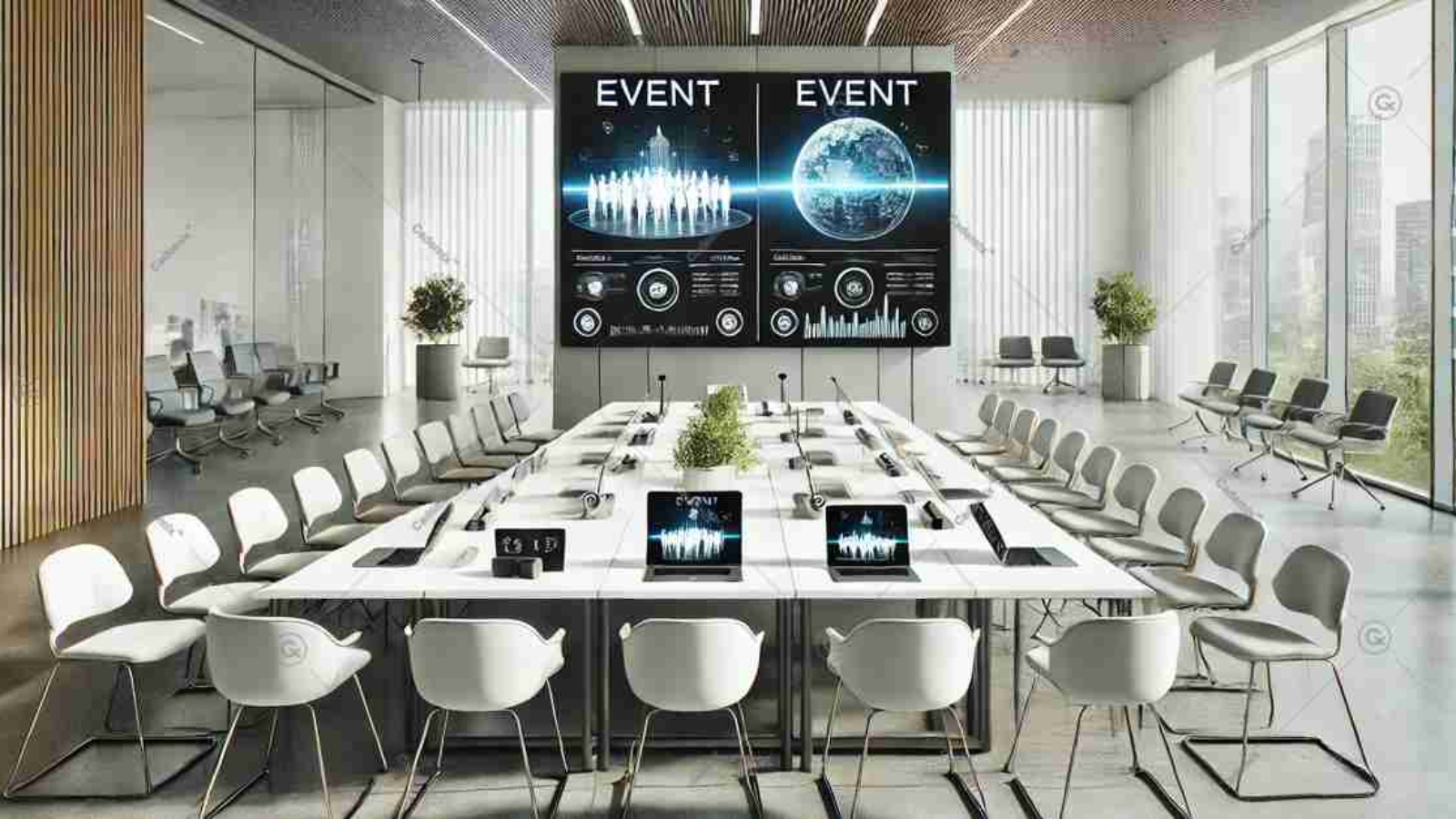This article delves into the future of Event Management, highlighting the most significant trends shaping the industry in 2024 and beyond. From the rise of hybrid events that blend physical and virtual experiences to the integration of AI in event planning, these innovations are transforming how events are conceptualized, executed, and evaluated. We also explore the growing importance of experiential marketing and sustainability, offering insights into how these strategies enhance audience engagement and promote eco-friendly practices with a focus on the latest event technology tools, effective communication, and leadership in event planning.
This article provides a comprehensive guide for professionals aiming to stay ahead in the evolving landscape of Event Management.
By Samareh Ghaem Maghami, Associate Consultant and Project at Cademix Institute of Technology
Introduction
In the dynamic world of Event Management, staying ahead of emerging trends is crucial for success. As we move into 2024 and beyond, the industry is witnessing a transformative shift driven by advancements in technology, innovative marketing strategies, and an increasing focus on sustainability. Event planners and professionals must adapt to these changes to remain competitive and deliver exceptional experiences. This introduction explores the key trends set to shape the future of event planning, from the growing prevalence of hybrid events and AI integration to the rise of experiential marketing and the importance of eco-friendly practices.
By embracing these developments, event management professionals can not only meet the evolving demands of their audiences but also drive innovation and success in their projects.

The Rise of Hybrid Events
As the landscape of Event Management continues to evolve, hybrid events have emerged as a pivotal trend that is reshaping the industry. These events, which seamlessly blend in-person and virtual experiences, offer unparalleled flexibility and reach, making them a favored choice for event planners looking to maximize engagement and attendance. The integration of technology in events plays a crucial role in the success of hybrid models, enabling real-time interactions, live streaming, and virtual networking opportunities that transcend geographical boundaries.
One of the key advantages of hybrid events is their ability to cater to a global audience, making them ideal for international event management. By combining physical and digital elements, event organizers can extend their reach beyond the confines of a single location, attracting participants from around the world. This approach not only enhances audience engagement but also proves to be cost-effective in terms of budget management.
Moreover, hybrid events are redefining project management in the event industry. The logistical challenges of coordinating both in-person and online components require meticulous logistics planning and vendor negotiation. However, the payoff is significant, as hybrid events offer a scalable solution that meets the diverse needs of modern audiences.
As we look ahead to 2024 and beyond, the prominence of hybrid events in event management is expected to grow. By leveraging the latest event technology tools and innovative event planning strategies, professionals can create immersive, interactive experiences that resonate with participants, no matter where they are. This trend underscores the importance of adaptability and creativity in the future of event management.
AI Integration in the Future of Event Planning
The integration of artificial intelligence (AI) into event management is revolutionizing how events are planned, executed, and evaluated. AI’s capabilities in data processing, automation, and personalization are transforming traditional event planning methods, making them more efficient, effective, and tailored to the needs of both organizers and attendees. As we move into 2024, the role of AI in event management is expected to expand, offering unprecedented opportunities for innovation and success.
One of the most significant impacts of AI in event planning is its ability to streamline logistics planning and vendor negotiation. AI-driven tools can automate complex tasks such as scheduling, budget optimization, and resource allocation, allowing event planners to focus on creative and strategic aspects of their events. Additionally, AI can assist in project management by predicting potential risks, providing real-time updates, and ensuring that events run smoothly and efficiently.
AI also plays a critical role in enhancing event technology tools, particularly in the areas of personalization and attendee engagement. Through data analysis and machine learning algorithms, AI can create customized experiences for participants, from personalized agendas and content recommendations to AI-powered chatbots that provide instant support and information. This level of personalization not only improves the attendee experience but also drives higher engagement and satisfaction.
Furthermore, AI integration facilitates effective communication with stakeholders, ensuring that everyone involved in the event is aligned and informed. AI tools can automate routine communications, generate detailed reports, and provide insights into attendee behavior and preferences, helping event planners make data-driven decisions that enhance the overall success of the event.
Looking ahead, the future of AI in event management is bright, with ongoing advancements in technology promising even more innovative solutions for event planning. From automating repetitive tasks to creating immersive, personalized experiences, AI is set to be a cornerstone of event management in 2024 and beyond. By embracing AI, event professionals can not only improve efficiency and outcomes but also stay ahead of the curve in an increasingly competitive industry.

Experiential Marketing: Engaging Audiences
In the rapidly evolving field of event management, experiential marketing has become a key strategy for creating memorable and impactful experiences that resonate with audiences long after the event concludes. As we look towards 2024 and beyond, event planners are increasingly leveraging experiential marketing to engage participants on a deeper level, transforming ordinary events into immersive, multi-sensory experiences that leave a lasting impression.
Experiential marketing is all about creating unique, interactive experiences that connect with attendees emotionally and physically. This approach goes beyond traditional marketing tactics, focusing on direct engagement and personal interaction to build stronger connections between brands and their audiences. In the context of event planning, this means designing events that are not just attended but experienced, with every element meticulously crafted to enhance the participant’s journey.
The success of experiential marketing in event management hinges on creativity in event planning. By thinking outside the box and incorporating innovative concepts, event planners can create environments that captivate and engage attendees. Whether it’s through interactive installations, live demonstrations, or immersive storytelling, the goal is to involve the audience in a way that makes them active participants rather than passive observers.
Moreover, experiential marketing is a powerful tool for event marketing. It allows brands to create buzz and generate word-of-mouth publicity, both of which are essential for increasing event visibility and attracting a larger audience. When executed effectively, experiential marketing can significantly enhance stakeholder management by demonstrating tangible value to sponsors and partners, ultimately leading to stronger relationships and more successful events.
As event management continues to evolve, the role of experiential marketing is set to grow, with more professionals recognizing its potential to drive engagement and achieve event objectives. By incorporating experiential marketing into their event planning strategies, organizers can create more dynamic and impactful events that resonate with audiences, build brand loyalty, and stand out in a crowded marketplace.
In 2024 and beyond, the most successful events will be those that prioritize experience, making experiential marketing an essential component of modern event management. By focusing on engagement, creativity, and interaction, event planners can ensure their events are not only attended but remembered, setting the stage for continued success in the ever-changing landscape of event management.
Sustainability: The Green Future of Event Planning
As the global focus on environmental responsibility intensifies, sustainability has become a critical consideration in event management. In 2024 and beyond, event planners are increasingly expected to adopt eco-friendly practices that minimize the environmental impact of their events while also meeting the growing demand from stakeholders and attendees for sustainable solutions. Sustainability in event management is no longer just a trend; it is becoming a standard practice that defines the future of the industry.
One of the primary drivers of this shift is the recognition that sustainable events are not only better for the planet but also beneficial for budget management. By reducing waste, optimizing energy use, and choosing sustainable materials, event organizers can often cut costs while also appealing to environmentally-conscious attendees and sponsors. This dual benefit makes sustainability a win-win for both the environment and the bottom line.
Implementing sustainability in event planning involves a holistic approach that touches every aspect of the event lifecycle, from logistics planning to vendor negotiation. Choosing eco-friendly venues, sourcing locally produced food and materials, reducing single-use plastics, and offsetting carbon emissions are just a few strategies that can help make events more sustainable. Additionally, the use of event technology tools can further support sustainability efforts by enabling virtual participation, reducing travel-related carbon footprints, and facilitating paperless operations.
Sustainability also plays a crucial role in stakeholder management. Sponsors, partners, and attendees are increasingly looking for events that align with their values, particularly when it comes to environmental responsibility. By demonstrating a commitment to sustainability, event planners can strengthen relationships with these key stakeholders, enhance the event’s reputation, and differentiate their events in a competitive market.
Moreover, sustainability is closely tied to the emerging event trends of 2024. As more organizations adopt sustainability as a core value, the demand for green events will continue to grow. This trend is not just about reducing environmental impact but also about creating events that are socially responsible and contribute to the well-being of communities. This broader perspective on sustainability reflects the evolving role of event management in shaping a more sustainable and equitable future.
In conclusion, the emphasis on sustainability in event management is set to increase as we move forward. Event planners who embrace eco-friendly practices will not only meet the expectations of their stakeholders but also lead the way in creating a more sustainable future for the industry. By integrating sustainability into every aspect of event planning, from concept to execution, professionals can ensure that their events are not only successful but also responsible and forward-thinking.

Post-Event Evaluation and Data Utilization
In the competitive landscape of event management, the work doesn’t end when the event does. Post-event evaluation is a critical component of the event planning process, offering invaluable insights that can shape future events and enhance overall performance. As we look towards 2024 and beyond, the importance of leveraging data for post-event evaluation cannot be overstated. This practice not only provides a clear picture of an event’s success but also informs more effective marketing strategies, budget management, and project management.
Post-event evaluation involves a thorough analysis of various aspects of the event, including attendee satisfaction, engagement levels, logistical execution, and ROI. By collecting and analyzing data from multiple sources, such as surveys, social media interactions, and on-site feedback, event planners can gain a deep understanding of what worked well and what needs improvement. This process is essential for identifying key areas where adjustments can be made to optimize future events.
The use of event technology tools plays a pivotal role in this data-driven approach. Advanced analytics platforms can automatically gather and analyze large volumes of data, providing detailed reports that highlight trends, patterns, and areas of success or concern. These insights can then be used to refine logistics planning, enhance vendor negotiation, and improve stakeholder management for upcoming events. Additionally, data-driven insights can inform creative event planning by revealing what types of experiences resonate most with attendees.
Post-event evaluation is also crucial for assessing the effectiveness of event marketing efforts. By analyzing data on attendance rates, engagement metrics, and participant feedback, event planners can determine which marketing strategies were most successful in attracting and engaging the target audience. This information is invaluable for refining future event marketing campaigns and ensuring that resources are allocated effectively to achieve the desired outcomes.
Moreover, post-event evaluation supports continuous improvement in event management. By systematically reviewing each event and applying lessons learned, event planners can enhance their skills, improve processes, and deliver even more successful events in the future. This commitment to ongoing improvement is essential for staying competitive in an industry that is constantly evolving.
In summary, post-event evaluation and the utilization of data are indispensable tools for modern event management. As the industry becomes increasingly data-driven, the ability to analyze and act on post-event insights will be a key differentiator for successful event planners. By embracing data and continuously refining their strategies, professionals can ensure that their events not only meet but exceed expectations, setting the stage for continued success in 2024 and beyond.
Leadership and Effective Communication in Event Planning
In the fast-paced and ever-evolving world of event management, strong leadership, and effective communication are critical elements that determine the success of any event. As the industry continues to grow and adapt to new trends in 2024 and beyond, the role of leadership in event planning is becoming increasingly important. Event planners who can inspire their teams, make strategic decisions, and communicate clearly with all stakeholders are the ones who will thrive in this competitive landscape.
Leadership in event planning involves more than just overseeing logistics and ensuring that everything runs smoothly. It requires a vision for the event, the ability to motivate and guide a team towards that vision, and the capacity to navigate challenges with confidence and creativity. Effective leaders in event management are those who can balance the big picture with the details, ensuring that every aspect of the event aligns with the overall goals and objectives.
One of the key aspects of leadership in event planning is the ability to foster effective communication across all levels of the event. This includes clear and consistent communication with team members, vendors, stakeholders, and participants. Effective communication ensures that everyone involved is on the same page, understands their roles and responsibilities, and can collaborate efficiently to achieve the desired outcomes. It also involves active listening, which allows leaders to address concerns, gather feedback, and make informed decisions.
Project management is another area where strong leadership and effective communication intersect. Leading a successful event requires the ability to manage multiple moving parts, from logistics planning and vendor negotiation to budget management and stakeholder management. Effective leaders use communication tools and strategies to keep the project on track, delegate tasks appropriately, and ensure that all deadlines are met. This level of coordination is essential for delivering a seamless and successful event.
Moreover, leadership in event management also involves the ability to adapt to new trends and technologies. As we move into 2024, event planners must be open to integrating new event technology tools, exploring innovative event marketing strategies, and adopting sustainable practices. Effective leaders are those who can guide their teams through these changes, ensuring that they are implemented smoothly and contribute to the overall success of the event.
Finally, leadership in event planning plays a crucial role in managing relationships with stakeholders, including sponsors, partners, and attendees. By communicating effectively and demonstrating a commitment to delivering value, event planners can build strong, long-lasting relationships that benefit both the event and the organization. This is particularly important in a competitive industry where reputation and trust are key factors in securing future opportunities.
In conclusion, as the field of event management continues to evolve, the importance of leadership and effective communication cannot be overstated. Event planners who cultivate these skills will be better equipped to manage the complexities of modern events, drive innovation, and achieve success in 2024 and beyond. By leading with vision, communicating with clarity, and embracing new trends, they can ensure that their events stand out in a crowded marketplace and leave a lasting impact on their audiences.

The Future of Event Planning: Trends Beyond 2024
As the world of event management continues to evolve, looking ahead to the trends that will shape the industry beyond 2024 is essential for event planners who want to stay ahead of the curve. The future of event planning will be defined by rapid advancements in event technology, increasing demand for personalized and immersive experiences, and a heightened focus on sustainability and global connectivity. Understanding these emerging trends is crucial for professionals aiming to innovate and lead in this dynamic field.
One of the most significant trends that will continue to influence event management is the ongoing integration of advanced event technology tools. From AI-driven personalization to virtual and augmented reality experiences, technology will play a central role in enhancing attendee engagement and creating more interactive events. Event planners will increasingly rely on these tools to deliver customized experiences that cater to the specific needs and preferences of their audiences, whether through personalized content, interactive sessions, or immersive environments.
In addition to technology, the future of event management will see a continued emphasis on experiential marketing and creative event planning. As audiences become more discerning and seek out unique, memorable experiences, event planners will need to push the boundaries of creativity to stand out. This will involve designing events that go beyond the traditional formats, incorporating elements such as live performances, immersive storytelling, and multi-sensory experiences that engage attendees on multiple levels.
Sustainability will also remain a key focus in the future of event planning. As environmental concerns continue to grow, event planners will be expected to adopt even more rigorous sustainability practices. This will include not only reducing the environmental impact of events through eco-friendly materials and energy-efficient venues but also integrating sustainability into every aspect of event management, from logistics planning to vendor negotiation. The events of the future will need to align with broader societal values, demonstrating a commitment to sustainability that resonates with both attendees and stakeholders.
Global connectivity will also play a crucial role in shaping the future of event management. As hybrid events become the norm, event planners will need to develop strategies that cater to both in-person and virtual audiences, ensuring that participants from around the world can engage meaningfully with the event. This will involve not only mastering the technical aspects of virtual event platforms but also creating content and experiences that are accessible and relevant to a diverse, global audience. International event management will require a nuanced understanding of cultural differences and the ability to deliver events that resonate across borders.
Finally, the future of event management will demand a greater focus on post-event evaluation and data-driven decision-making. As events become more complex and personalized, the ability to gather, analyze, and act on data will be crucial for continuous improvement. Event planners will need to use data not only to measure success but also to refine their strategies and deliver even more impactful events in the future.
In conclusion, the future of event management beyond 2024 will be shaped by a combination of technological innovation, creative event design, sustainability, global connectivity, and data-driven insights. Event planners who embrace these trends and integrate them into their practices will be well-positioned to lead the industry and deliver events that are not only successful but also transformative. By staying ahead of these trends, professionals in event management can ensure that their events remain relevant, engaging, and impactful in an ever-changing landscape.
Conclusion
The landscape of event management is undergoing a profound transformation, driven by rapid advancements in technology, evolving audience expectations, and a growing emphasis on sustainability. As we look towards 2024 and beyond, event planners must stay informed about the latest trends and be prepared to adapt their strategies to remain competitive and successful in this dynamic industry.
The rise of hybrid events has revolutionized the way events are conducted, offering a flexible model that combines the best of both physical and virtual experiences. Coupled with the integration of AI in event planning, these innovations are streamlining operations, enhancing personalization, and improving overall efficiency, enabling event planners to deliver more impactful and engaging events.
Moreover, the importance of experiential marketing cannot be overstated. As audiences increasingly seek meaningful and memorable experiences, event planners must prioritize creativity in event planning to craft immersive environments that resonate with participants on a deeper level. The focus on sustainability is also set to intensify, with eco-friendly practices becoming a standard expectation in event management. By adopting sustainable solutions, event planners can not only meet the demands of environmentally conscious stakeholders but also contribute positively to the global effort towards a greener future.
Leadership and effective communication are foundational elements that will continue to play a critical role in the success of events. Strong leadership ensures that every aspect of event planning is executed seamlessly, while clear communication fosters collaboration and alignment among all parties involved.
Looking ahead, the future of event management will be shaped by ongoing innovation, with emerging trends such as advanced event technology tools, data-driven post-event evaluation, and global connectivity taking center stage. Event planners who embrace these trends and continually refine their strategies will be well-equipped to navigate the challenges and opportunities of the future, delivering events that not only meet but exceed expectations.
In summary, staying ahead in event management requires a proactive approach, a willingness to innovate, and a commitment to continuous improvement. By focusing on the trends and strategies outlined in this article, event planners can position themselves at the forefront of the industry, creating events that are not only successful but also transformative and memorable for all involved.

About the Author
Samareh Ghaem Maghami is a seasoned professional with a diverse background in event management, interior decoration, and painting. With over nine years of experience in both creative and executive roles, she brings a unique blend of artistic vision and strategic expertise to every project. Currently, she is furthering her academic pursuits as a master’s student at Wiener Neustadt, Austria, and is an active member of the Cademix Institute of Technology, where she contributes to the intersection of technology and the arts. Her passion for innovation and practical solutions is evident in her work and writings, particularly in the ever-evolving field of event management.
For those interested in exploring more about the future of event planning and related topics, Samareh invites you to read her latest article on “Sustainability in Event Planning: How to Go Green“ published in Cademix Magazine.
To discuss ideas, collaborate, or learn more about her work, please feel free to contact her directly. Stay connected and explore her other insightful articles that delve into the intersection of technology, creativity, and event management.
Please feel free to contact her at:
E-mail: sam.gh.maghami@gmail.com
E-mail: samareh.ghaem-maghami@cademix.org
LinkedIn: https://www.linkedin.com/in/samareh-ghaem-maghami
Xing: https://www.xing.com/profile/Samareh_GhaemMaghami

